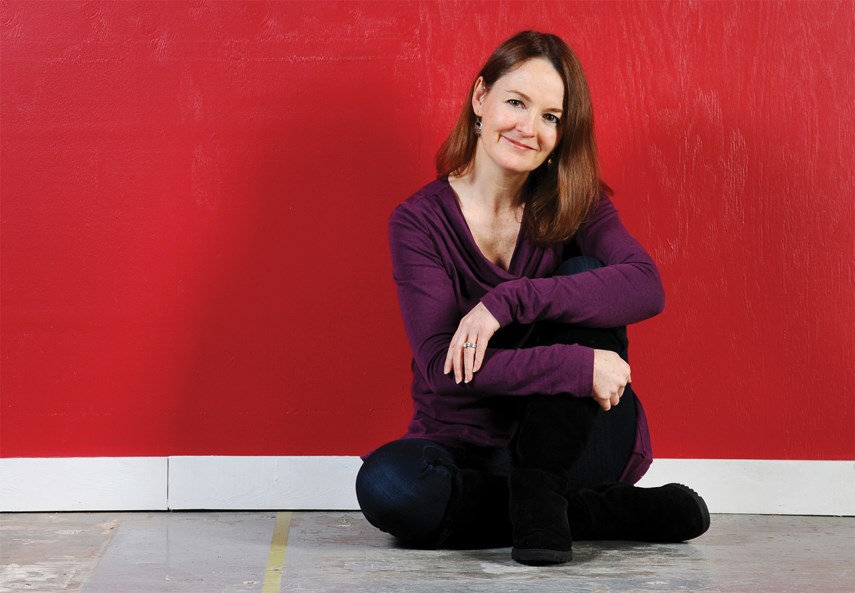What she lacked in experience she made up for with the very best kind of ignorance.
Sarah Dodd was unaware of the improbability of a successful career in television writing and incurious about the risk of failure.
“I was young and stupid enough to think I could do anything,” she says with a laugh.
Between sips of a hot drink at a teeming Edgemont café, Dodd reflects on the career trajectory that took her from the University of Victoria to showrunner on the second season of Canadian cop mystery show Cardinal.
The launching point of her career was the short-lived comedic melodrama Flash Forward, which featured future stars Jewel Staite ( Da Vinci’s Inquest, Firefly) and Ben Foster (Hell or High Water). While Dodd’s duties included no actual writing, Flash Forward’s writers possibly sensing a fellow traveller, included Dodd in conversations about the creative direction of the show.
“They knew I was an aspiring writer myself,” she says.
With Flash Forward’s first season winding down, the writers were storing plots for next season like squirrels readying for winter.
Dodd pitched a story that involved the two leads – each of them feeling the first stirrings of romantic feelings for each other – acting in the school play.
The plot, Dodd explains, likely grew from her own experience putting on a high school play.
They bought her pitch – right before the show’s second season was cancelled.
For a moment, it seemed like Dodd’s idea would be interred on a series of index cards destined never to see lights, camera or action. However, a reworked version became Flash Forward’s series finale.
While Dodd wasn’t allowed to write the episode due to obligations to other writers on staff, the successful pitch allowed her to join the Writers Guild of Canada, get an agent, and most importantly, “keep going.”
She worked on PSI Factor: Chronicles of the Paranormal (“poor cousin of The X-Files”) BeastMaster, Arctic Air and Motive.
But it was while she was living in London, England writing Ransom that she got a call from Sienna Films (which also produced Ransom) to become the showrunner for Season 2 of Cardinal, based on the books by Giles Blunt.
“This is the kind of show I’ve always wanted to do,” she says, discussing recent police procedurals like The Killing and Broadchurch. “I love that stuff.”
The show follows detective John Cardinal through Algonquin Bay, a rugged landscape alternately blanketed by snow and blackflies located 400 kilometres north of civilization; “by which Canadians mean Toronto,” Blunt writes.
The twisting, turning stories were written “in a very cinematic style,” that lent itself to television, according to Dodd. The only problem was the books weren’t quite long enough for six hours of television.
“We added some storylines, we added some characters,” Dodd explains.
In the book, detective Lise Delorme is, “very much the object of Cardinal’s desire and not much else,” Dodd says. To make the show work, the writers had to create “a life of her own.” And in order to get it all written before the blackflies start buzzing, Dodd recruited two writers and an intern.
“For five weeks we huddled in a room at Lonsdale Quay,” she says.
“All around us were index cards with plots twist and character moments and visual moments and all six episodes eventually up on those walls,” she says. “The other offices were inhabited by mainly psychiatrists so we can only imagine what they were thinking. . . . We looked like A Beautiful Mind in there.”
As opposed to a singular author who becomes creator, preserver and potential destroyer of his work, a television writer needs to be collegial and collaborative.
“No idea is really a bad idea. You have to be confident enough to throw out every idea, no matter how bad, because somebody else in the room might take that idea and transform it.”
Discussing the writer’s room, the conversation drifts to Dodd’s days in the University of Victoria’s creative writing program and the workshops where everyone discusses everyone else’s writing.
It’s a fantastic training ground for TV, she explains. “You have to put so much of yourself into your work but at the same time you have to grow a thick enough skin to be able to take whatever construction criticism – or not constructive – comes your way.”



